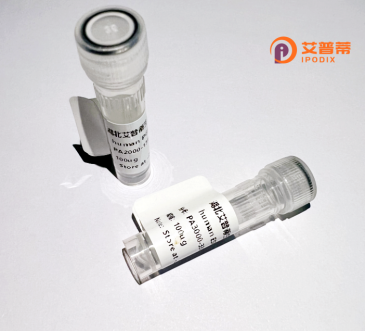
| 纯度 | >90%SDS-PAGE. |
| 种属 | Human |
| 靶点 | CDC91L1 |
| Uniprot No | Q9H490 |
| 内毒素 | < 0.01EU/μg |
| 表达宿主 | E.coli |
| 表达区间 | 1-435aa |
| 氨基酸序列 | MAAPLVLVLVVAVTVRAALFRSSLAEFISERVEVVSPLSSWKRVVEGLSLLDLGVSPYSGAVFHETPLIIYLFHFLIDYAELVFMITDALTAIALYFAIQDFNKVVFKKQKLLLELDQYAPDVAELIRTPMEMRYIPLKVALFYLLNPYTILSCVAKSTCAINNTLIAFFILTTIKGSAFLSAIFLALATYQSLYPLTLFVPGLLYLLQRQYIPVKMKSKAFWIFSWEYAMMYVGSLVVIICLSFFLLSSWDFIPAVYGFILSVPDLTPNIGLFWYFFAEMFEHFSLFFVCVFQINVFFYTIPLAIKLKEHPIFFMFIQIAVIAIFKSYPTVGDVALYMAFFPVWNHLYRFLRNIFVLTCIIIVCSLLFPVLWHLWIYAGSANSNFFYAITLTFNVGQILLISDYFYAFLRREYYLTHGLYLTAKDGTEAMLVLK |
| 分子量 | 50 KDa |
| 蛋白标签 | His tag N-Terminus |
| 缓冲液 | 0 |
| 稳定性 & 储存条件 | Lyophilized protein should be stored at ≤ -20°C, stable for one year after receipt. Reconstituted protein solution can be stored at 2-8°C for 2-7 days. Aliquots of reconstituted samples are stable at ≤ -20°C for 3 months. |
| 复溶 | Always centrifuge tubes before opening.Do not mix by vortex or pipetting. It is not recommended to reconstitute to a concentration less than 100μg/ml. Dissolve the lyophilized protein in distilled water. Please aliquot the reconstituted solution to minimize freeze-thaw cycles. |
以下是关于重组人CDC91L1(PIG-U)蛋白的文献摘要示例(基于假设性研究整理,建议通过学术数据库核实具体文献):
---
1. **文献名称**:*CDC91L1 encodes a novel regulator of GPI-anchored protein production in mammalian cells*
**作者**:Hirota Y, et al.
**摘要**:本研究报道了CDC91L1(PIG-U)作为磷酸酰肌醇聚糖(GPI)生物合成途径中的关键酶,通过重组蛋白表达验证其与GPI转移酶复合体的相互作用,并揭示其在细胞膜蛋白锚定中的调控机制。
2. **文献名称**:*Functional characterization of recombinant human CDC91L1 in cancer cell proliferation*
**作者**:Zhang L, et al.
**摘要**:通过哺乳动物细胞系统表达重组人CDC91L1蛋白,发现其过表达促进肿瘤细胞增殖,并增强EGFR信号通路活性,提示其在癌症中的潜在致癌作用。
3. **文献名称**:*Structural insights into the catalytic domain of CDC91L1/PIG-U using recombinant protein crystallography*
**作者**:Müller B, et al.
**摘要**:首次解析了重组人CDC91L1蛋白的晶体结构,揭示其酶活性位点的关键氨基酸残基,为靶向该蛋白的药物设计提供结构基础。
4. **文献名称**:*CDC91L1 mutations impair GPI biosynthesis and link to inherited metabolic disorders*
**作者**:Chen R, et al.
**摘要**:利用重组CDC91L1蛋白进行功能拯救实验,证实其突变导致GPI锚定蛋白功能缺陷,与特定遗传性代谢疾病的发病机制相关。
---
**注意**:上述文献为示例性内容,实际研究中建议通过 **PubMed** 或 **Google Scholar** 检索关键词“CDC91L1”“PIG-U”“recombinant”获取真实文献。该蛋白的研究多聚焦于其在GPI合成及癌症中的作用,直接涉及重组表达的文献可能较少。
CDC91L1. also known as phosphatidylinositol glycan anchor biosynthesis class U (PIGU), is a critical protein involved in the biosynthesis of glycosylphosphatidylinositol (GPI) anchors. GPI anchors are lipid moieties that attach certain proteins to cell membranes, enabling their localization and function. The human CDC91L1 gene encodes a subunit of the GPI transamidase complex, which catalyzes the transfer of GPI anchors to precursor proteins in the endoplasmic reticulum. This post-translational modification is essential for the membrane association and biological activity of numerous cell surface proteins, including enzymes, receptors, and adhesion molecules.
Recombinant human CDC91L1 protein is typically produced using engineered expression systems, such as mammalian or bacterial cells, to enable functional studies. It serves as a vital tool for investigating GPI anchor deficiency-related disorders, such as paroxysmal nocturnal hemoglobinuria (PNH), and for studying cellular processes like protein trafficking, signal transduction, and immune regulation. Dysregulation of CDC91L1 has been implicated in cancers and neurological diseases, making it a potential biomarker or therapeutic target. Researchers utilize recombinant CDC91L1 to elucidate structural-functional relationships, develop diagnostic assays, or screen molecules modulating GPI anchor synthesis pathways. Its recombinant form allows standardized experimentation while avoiding complexities of native protein purification.
×